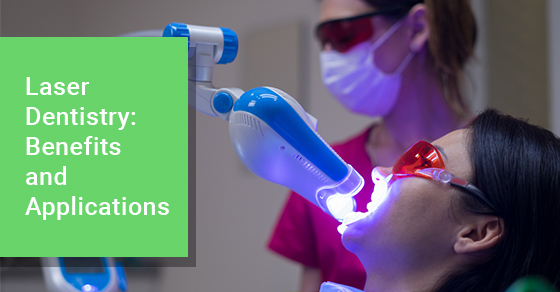Blog

Laser Dentistry: Benefits and Applications
Posted by Dr. Julie Boudreault On 9-09-2019
Laser dentistry provides treatment for a number of different dental conditions. It tends to be more comfortable when compared to traditional surgery and dentistry. It can be used for many different applications, involving both hard and soft tissue. It is more effective, less painful, and also quicker healing when compared to using drills and other non-laser tools. LASER stands for “light amplification by the stimulated emission of radiation.” It uses light energy, which creates a focused beam that can target tissue to easily remove damage or make precise incisions to remove or shape the tissue. Here are the benefits and applications of the dental laser treatment that Milton patients might require.
How is laser dentistry used?
There are many applications for laser dentistry including:- Treating hypersensitivity
- Treating tooth decay
- Treating gum disease
- Whitening teeth
What is the difference between hard and soft tissue treatments?
Hard tissue treatments are used for your teeth, while soft tissue refers to the gums. Hard tissue procedures might include:- Cavity detection
- Tooth preparations and dental fillings
- Treating tooth sensitivity
- Cosmetic dental services such as improving a “gummy smile”
- Crown lengthening
- Treating tongue frenulum attachment
- Removing soft tissue folds
How is laser dentistry performed?
Laser dentistry is a minimally invasive option for a range of dental procedures. It is the most innovative, safest and most comfortable treatments we offer our patients, whether you require restorative treatments or gum surgery. This is because lasers can be used to alter or remove tissue quickly and comfortably, making it the ideal treatment for those who might be anxious about their appointment. As well, laser dentistry eliminates the need for sutures and can often be performed without anesthesia. The sterilizing effect of the lasers lessens the likelihood of infection, reduces bleeding, and speeds up the healing process. Laser dentistry can be used for a variety of procedures, including:- Tongue-tie and laser frenectomy
- Cold sore laser treatment
- Canker sore laser treatment
- Denture sore laser treatment
- Skin tag and lesion laser removal
- Gingivectomy and gingivoplasty
- Gum disease laser treatment
What is TMJ laser therapy?
If you suffer from temporomandibular joint (TMJ) pain or temporomandibular dysfunction, your symptoms might include:- Pain on opening
- Inability to open wide or move from side to side comfortably
- Neck and shoulder pain
- Ear pain and hearing loss
- Ringing in the ears
- Clenching and night grinding
- Chronic fatigue
- Noise, grating, or popping in the joint
- Chronic temporal or occipital headache
What is a laser frenectomy?
We offer laser frenectomy for babies and patients with tongue-tie. It quickly separates the frenulum from the tongue to return proper function and movement. The soft tissue laser does not cut the tissue, so it is quicker and safer than using a conventional cutting method. This is a more comfortable procedure for infants than traditional frenectomies, as you can hold your baby to keep them safe and calm. It also requires no downtime and your baby experiences no pain. You can begin feeding your baby immediately following the procedure.Is laser dentistry expensive?
Laser treatments vary in price, based on the procedure and the laser equipment used. In many cases, it can be more affordable than non-laser treatments, as it usually requires fewer sessions. As well, you might have coverage under your dental benefits. We can provide a quote for your treatment and also submit the proposed treatment to your insurance provider to see if you are covered.What types of lasers are used?
The laser used is based on whether you need hard tissue or soft tissue treatments. Hard tissue lasers are used to prepare or shape teeth for:- Composite bonding
- Repair dental fillings that have worn down
- To remove some tooth structure
- Canker sores
- Gum surgery
- Frenectomy
Benefits of Laser Dentistry
There are many benefits to laser dentistry, including:- A decreased need for sutures
- Bleeding is minimized, as the laser promotes healing through cauterization
- Anesthesia is usually unnecessary
- Bacterial infection risk is reduced, as lasers sterilize the area
- Wounds can heal faster, and tissue can regenerate
- Less damage is caused to the surrounding tissues
- Lasers used to treat periodontitis kill bacteria and activate tissue regrowth
- Nerve endings and blood vessels are sealed while they penetrate the tissue
- Less pain
- Faster healing
Disadvantages of Laser Dentistry
There are a few disadvantages to laser dentistry, including:- They can’t be used on metal amalgam fillings
- Hard lasers can sometimes injure tooth pulp in certain treatments
- They still often have to be used in hand with drills to complete treatments such as fillings
- They can’t be used for all treatments
- There is a risk of gum injury, but no more so than any other dental treatment
Are there any risks associated with laser dentistry?
As long as you receive treatment from a qualified dental professional, like Dr. Julie, there are very few risks associated with laser dentistry. She will ensure she is using the appropriate wavelength or power level to avoid damage. There is also some risk of eye damage. However, we will provide special glasses to protect your eyes from the laser. If you have any questions about dental laser treatments or would like to book a consultation with Dr. Julie, please call Milltown Dental at 905-878-8528 or contact us here.
